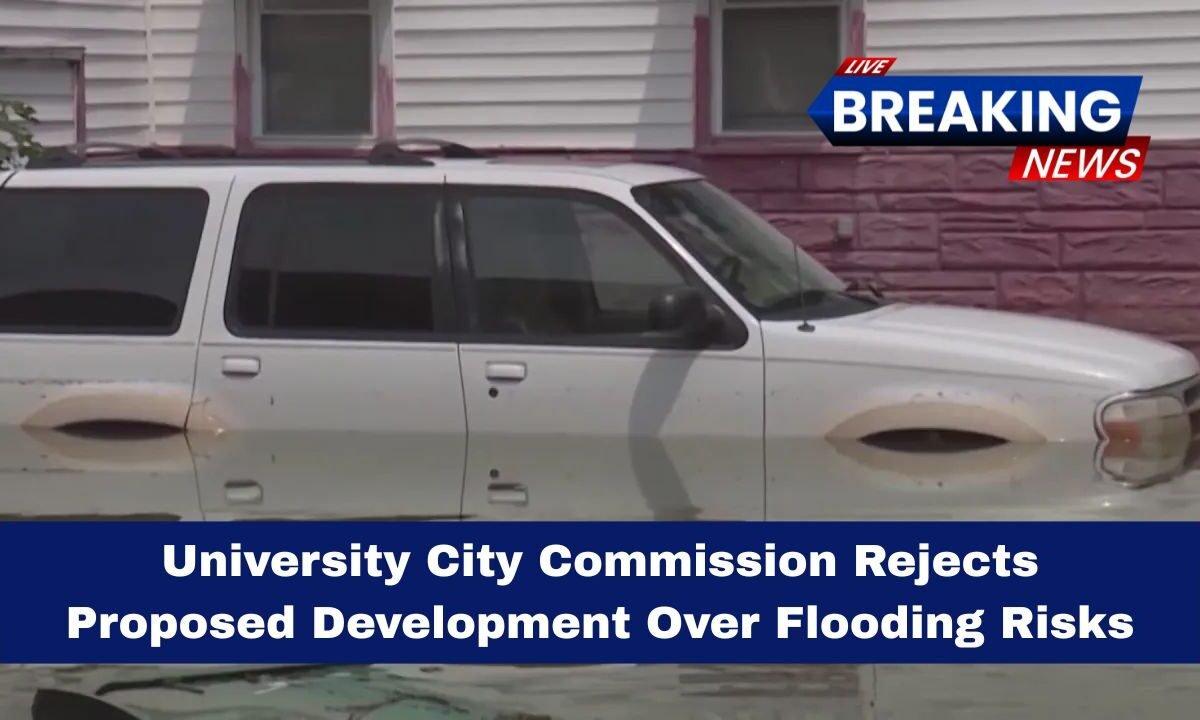On October 7, 2025, the University City Stormwater Commission voted unanimously to deny recommendation for a proposed 106-unit townhome development called The Enclaves at Canton Avenue.
The site, about 11 acres of wooded land adjacent to United Hebrew Cemetery, sits just north of the River Des Peres flood zone.
Commissioners said the application lacked detailed hydrologic analysis and did not convincingly show the project would not worsen flash flooding in nearby areas.
The proposal now moves to the City Council for decision on October 13, 2025.
Project At a Glance
| Feature | Planned / Reported Value |
|---|---|
| Number of Units | 106 townhomes |
| Land Area | Approximately 11 acres |
| Parking Spaces | ~230 |
| Detention Basins | Two basins |
| Capacity of West Basin | ~433,691 gallons |
| Capacity of East Basin | ~281,963 gallons |
| Commission Decision | Unanimous “do not recommend” |
| Principal Concern | Increased runoff and flash flood risk |
| Next Decision Maker | University City Council on Oct 13, 2025 |
Why the Stormwater Commission Said No
- The commission judged the submission inadequate, particularly lacking comparisons of pre- vs. post-development runoff and storm modeling under intense rainfall conditions.
- The project would radically alter what is now a forest buffer that absorbs rain. Removing trees and soils that naturally infiltrate water could increase runoff volumes and accelerate flood peaks.
- The detention basins proposed may not sufficiently mitigate runoff during extreme storms, especially near or within the River Des Peres floodplain.
- Commissioners worried about cumulative effects of paving new east-west streets, similar to ones that had been flood-prone in past heavy rain events.
Local homeowners expressed concern that the project would direct water into backyards and basements, replicating conditions from the 2022 flash flood event that devastated parts of University City.
What the Developer Has Put Forward
- The plan includes about 230 parking spots and two detention ponds designed to hold a combined ~715,654 gallons of stormwater temporarily.
- The design suggests the developer intends to capture and slow runoff before release, but no sufficient demonstration of safety margins or storm return period performance was included.
- The developer did not attend the stormwater meeting and was not available for comment.
Community & Procedural Context
- Earlier in the review process, the city’s Plan Commission and Traffic Commission gave recommendations in favor of approval, finding the project met certain zoning and circulation guidelines.
- The stormwater commission’s role is advisory, but its concerns carry weight due to the city’s flood-vulnerability history and ongoing efforts to refine a Stormwater Master Plan.
- Supporters argue bringing residential density and engineered runoff controls can align with flood safety. Opponents counter that robust hydrologic proof must precede approval, especially in already risky zones.
Why This Decision Is Significant
University City has a long track record of stormwater challenges due to its location in the River Des Peres watershed.
The balance between development goals and resilient infrastructure is delicate.
This rejection underscores that engineered drainage alone must be backed by rigorous data when built near sensitive floodplain and steep drainage corridors.
If the council approves without addressing the commission’s concerns, residents fear increased frequency and severity of flooding incidents, especially under an era of intensifying storms.
By rejecting the proposed development over flooding concerns, University City’s stormwater commission has sent a clear signal: no development in sensitive zones without rigorous hydraulics and hydrology proof.
The 106-unit Enclaves at Canton Avenue project, sitting just north of a floodplain and replacing 11 acres of forest, raises critical questions about stormwater management, runoff mitigation, and community safety.
All eyes will now turn to the City Council’s October 13 decision, where the developer must address these concerns—or risk losing approval entirely.




